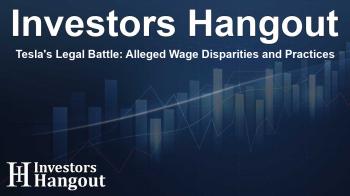Tesla's Legal Battle: Alleged Wage Disparities and Practices

Tesla Faces Class Action Lawsuit
Tesla Inc. (NASDAQ: TSLA) finds itself in a significant legal predicament as a proposed class action emerges in federal court. Accusations claim that the electric vehicle giant has shown a preference for hiring foreign visa holders at the expense of American workers, a practice that may lead to lower wages for U.S. citizens. This lawsuit highlights systemic issues within Tesla's hiring and termination processes that allegedly favor H-1B visa holders.
Details of the Legal Complaint
The lawsuit, lodged in a federal court, contends that Tesla's hiring methods are discriminatory, violating civil rights laws. The plaintiffs assert that in 2024, Tesla employed around 1,355 H-1B visa workers while laying off more than 6,000 domestic workers, most of whom are believed to be U.S. citizens. This stark contrast raises valid concerns about the company's commitment to its domestic workforce.
Plaintiffs Speak Out
Among the plaintiffs are Scott Taub, a software engineer, and Sofia Brander, a human resources specialist. They claim they were overlooked for positions after revealing they didn't require sponsorship. Taub noted that one job posting was exclusively for H-1B candidates. Similarly, Brander felt slighted for a position despite her previous work as a contractor at Tesla.
Allegations of Wage Theft
The complaint also accuses Tesla of wage theft, citing that the company prefers to hire visa workers, who can be compensated at lower rates than their U.S. counterparts for similar work. This practice, if proven true, could severely undercut the livelihoods of many American employees.
Elon Musk's Defense of the Visa Program
Adding more layers to this issue, the lawsuit references a December 2024 post on X (formerly Twitter) by Tesla's CEO Elon Musk. Musk, a naturalized U.S. citizen who once held an H-1B visa himself, emphasized the importance of this visa program for the growth of American businesses, indicating that many innovators contributing to major companies migrated to the U.S. through this pathway.
Implications for U.S. Workers
The legal representatives for the plaintiffs believe the outcome of this case could have far-reaching consequences, potentially impacting thousands of American job seekers who applied for positions at Tesla but were not hired or lost their jobs while visa holders retained theirs.
Wider Context: Hiring Practices Under Scrutiny
This lawsuit is part of a broader trend where corporate hiring practices are subjected to increased scrutiny. Amid a shifting political landscape, companies are reevaluating their hiring protocols as federal regulations change. Notably, former President Donald Trump introduced measures stifling diversity and inclusion initiatives for federal contractors—a decision that has prompted major corporations to reconsider their labor strategies.
Tesla's Financial Challenges
Amid these legal troubles, Tesla is also grappling with financial pressures. In a recent earnings report, the company disclosed revenue of $22.5 billion for the second quarter of 2025, reflecting a 12% year-over-year decline that fell short of analysts' predictions. To address these challenges, Tesla has commenced early production of more affordable models and is investing in new ventures, such as the Tesla Semi and Cybercab, targeting mass production in 2026.
Market Performance and Future Outlook
Despite the ongoing challenges, TSLA has shown resilience in the market, trending positively across different intervals. Investors continue to keep a close watch on the automaker's strategic decisions moving forward, particularly in light of the lawsuit and its implications for public perception and employee morale.
Frequently Asked Questions
What is the main allegation against Tesla?
Tesla is accused of favoring H-1B visa holders over U.S. citizens in hiring practices, potentially leading to wage disparities.
Who are the plaintiffs in the lawsuit?
The plaintiffs, Scott Taub and Sofia Brander, allege they were denied interviews after revealing they did not require sponsorship.
What does the lawsuit claim about wage theft?
The lawsuit states that Tesla prefers H-1B workers because they can be paid less than U.S. employees for similar roles.
What recent comments did Elon Musk make regarding H-1B visas?
Elon Musk defended the H-1B visa program, citing its importance for America’s innovation and growth.
How is Tesla performing financially amid this lawsuit?
Tesla reported a revenue decline of 12% in Q2 2025, prompting the company to shift its production strategies to remain competitive.
About The Author
Contact Dominic Sanders privately here. Or send an email with ATTN: Dominic Sanders as the subject to contact@investorshangout.com.
About Investors Hangout
Investors Hangout is a leading online stock forum for financial discussion and learning, offering a wide range of free tools and resources. It draws in traders of all levels, who exchange market knowledge, investigate trading tactics, and keep an eye on industry developments in real time. Featuring financial articles, stock message boards, quotes, charts, company profiles, and live news updates. Through cooperative learning and a wealth of informational resources, it helps users from novices creating their first portfolios to experts honing their techniques. Join Investors Hangout today: https://investorshangout.com/
The content of this article is based on factual, publicly available information and does not represent legal, financial, or investment advice. Investors Hangout does not offer financial advice, and the author is not a licensed financial advisor. Consult a qualified advisor before making any financial or investment decisions based on this article. This article should not be considered advice to purchase, sell, or hold any securities or other investments. If any of the material provided here is inaccurate, please contact us for corrections.

